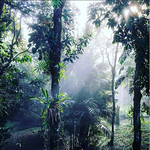
More photos from this internship can be found here.
This tropical research station is located off the beaten track in rural Costa Rica, and manages land for resource conservation, research and education. The station protects a watershed, native species, and works to contain areas of livestock and agricultural development. It is home to the most famous botanical garden in Central America, which features beautifully diverse tropical and subtropical plantings, as well as rare and endangered plants from Costa Rica and elsewhere.
Interns will be given the opportunity to participate in research, sustainability projects, or educational activities relevant to their fields of study. Many of the research projects are conducted in the primary and secondary old-growth forests. Students interested in research and fieldwork experience in a unique and diverse, tropical environment.
The host organization is a consortium of more than 60 universities and scientific research centers, and was founded to provide leadership in education, research and the responsible use of natural resources in the tropics. The consortium owns and operates three biological stations in Costa Rica, including this biological station and botanical garden.
This biological station owns one of the largest remaining forest fragments in the region. With a little more than 200 hectares of primary forest and 150 hectares of adjacent secondary forest, the fragment is home to some 2000 native plant species. The area is protected for resource conservation, scientific research and education.
Additionally, the biological station manages a 10-hectare botanical garden with over 3000 plant species from all over the tropical world. In addition to research, the station offers a “Garden as a School” educational program providing students at all levels a hands-on learning experience about the scientific method, ecosystems biodiversity, forest dynamics, and much more. The station also has an environmental outreach program with local community groups.
Interns will have the opportunity to work on station research and sustainability projects at the host site, and may support educational outreach and activities as well, depending on their level of Spanish. Interns will work four days per week on a primary project, with the fifth weekday focused on a community project. Interns will be supervised by the Resident Biologist, Sustainability Coordinator or, in some cases, Principal Investigators on various projects. If an intern has significant experience in geographic information systems (GIS), there are options to work in this area.
Winter and spring terms are the busiest times at this site, due to seasonal weather conditions and an influx of researchers and scientific staff. Interns are likely to have increased opportunities and come into contact with more professionals in relevant fields during the winter and/or spring terms.
Activities may consist of the following:
Research Projects
Some illustrative research topics and related internship tasks could include:
Environmental Sustainability
Supporting the station’s Sustainability Coordinator with projects related to the Blue Flag Ecological Program (PBAE) and Certificate for Sustainable Tourism (CST).
Educational Activities
In collaboration with the station’s Environmental Education and Sustainability efforts, interns may help:
High level of: Maturity, personal responsibility, cultural sensitivity, professionalism, independence, demonstrated initiative, independent problem-solving skills, adaptability, and patience.
Budgeting Note: Estimated costs are based on typical internship-related costs and a modest standard of living. Each intern’s costs will vary based on lifestyle choices (eating out vs. cooking or eating provided meals, taking taxis vs. walking or taking the bus) and recreational spending (travelling on days off, expensive hobbies, etc.).
The Host Site Fees include:
* No visa required for U.S. citizens. Non-U.S. citizens should check with the embassy.
** Fees vary based on medical history and insurance coverage
*** Check with your university's Global Opportunities Office for their pricing
**** Airport pick-up can be arranged with site in advance for an additional fee of $260 from San Jose airport
On-site accomodations are provided, and include three meals a day. Interns should expect to share a room. There are various lodging accommodations available at the station, and the host site will make arrangements for the intern based on availability. Wifi and laundry service are available.
Check out pictures from this internship.
A Guide for Future Interns in Las Cruces – From navigating cultural norms like throwing toilet paper in the trash and understanding the friendliness (and chaos) of “Tico Time,” to budgeting for town visits, managing gender dynamics, and adjusting to life at the research station, this reflection highlights the realities of living and working in rural Costa Rica.
"People here are very easygoing, informal, and friendly. Everyone uses WhatsApp to communicate, meals follow their own rhythm, and you’ll quickly learn that flexibility is the key to enjoying the experience."
— Julia, Oregon State University
Fall: April 15
Winter: September 15
Spring: November 15
Summer:
- See Qualifications & Requirements section